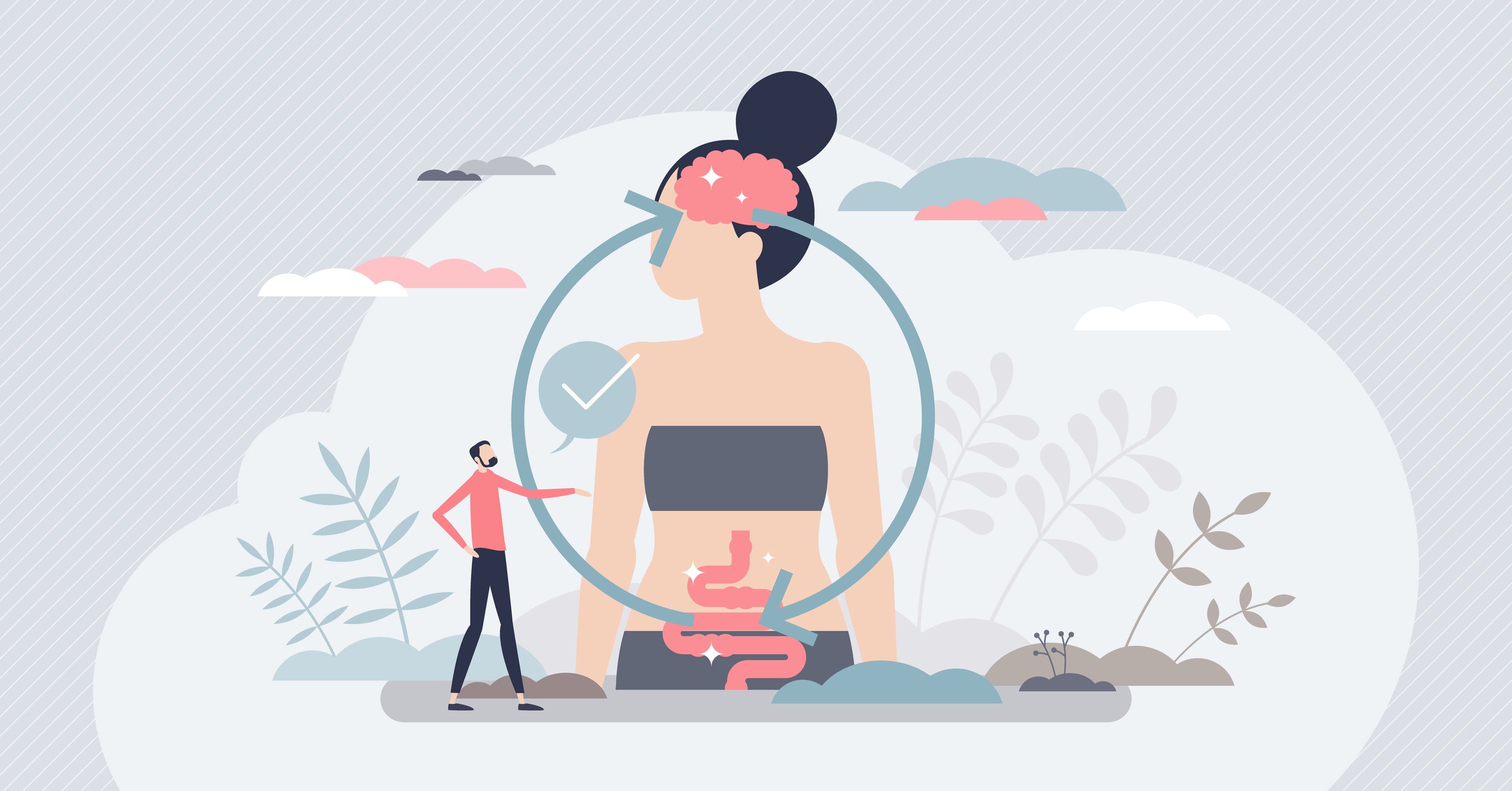The Body (Gut) Mind Connection
Gut-Mind Connection? You read correctly. It's not just an interesting concept, it's true! Research is confirming how this complex interaction takes place and it's fascinating! In this latest edition of our holistic health series, Melissa Rodriguez, BJU's Patient Outreach and Education Manager, talks about this and the three proven actions we can take to help calm our mind and our digestive system.
There are receptors to these molecules (neuropeptides) in your immune system, in your gut and in your heart. So when you say, 'I have a gut feeling' or 'my heart is sad' or 'I am bursting with joy,' you're not speaking metaphorically. You're speaking literally.
-Deepak Chopra
Everyone has heard of the mind-body connection, but it’s not just an interesting idea, it’s fact! Science is constantly showing us new ways in which this connection works, and there’s no greater example than the link between our gut (or the digestive tract) and our brain. Though it may seem hard to believe, what happens in our gut directly impacts our mood, and vice-versa, our emotions can impact our digestive functions.
This complex interaction is known as the gut-brain-axis. The communication that takes place between these two organs occurs through various systems, including the nervous system, the endocrine system (through our hormones), and our immune system. The gut-brain axis is like a two-way street, a bi-directional pathway that connects the brain with our digestive tract.
Did you know that our digestive tract is actually considered the largest endocrine organ in our body? This is because it releases hormones and other messenger molecules such as neuropeptides. Neuropeptides are biologically active compounds that originate from nervous tissue and impact our behavior and physiology, and they are not only found in the brain but also in the gut, the heart, and lungs.
The Irritable Bowel Syndrome
Okay, so now that we’ve gotten some of the scientific terminologies out of the way, let’s think about this in a real world scenario. Irritable Bowel Syndrome (IBS) is a condition of the digestive tract which causes symptoms such as diarrhea, constipation, abdominal pain and bloating.
The cause for these symptoms is not clear. There is no evidence in the gut for why someone would experience the discomfort they do. What is clear is that stress, anxiety, and depression significantly impact the condition. For example, hormones are released when feeling stressed, which can cause inflammation in the gut, alterations to blood flow, changes to the speed with which food moves through the digestive tract, and a shift in the intestinal bacteria colony. All of these factors can lead to the bothersome symptoms related to IBS.
Thankfully science is giving us the tools to help counteract the harmful effects of stress on the gut. Here are three proven actions we can take to help calm our mind and our digestive system:
Diaphragmatic or belly breathing
Breathing exercises can help bring our body to a state of relaxation by slowing our breath, heart rate, and blood pressure. Follow these steps:
Place one hand over your chest, the other over your belly.
Breathe in through your nose and allow your abdomen to expand. The hand over your chest should be still, the one over your belly should move away from your body.
Then breathe out through your mouth, allowing your belly to fall back down. Try inhaling for a count of 4 and exhaling for 8. If this is easy, inhale for 5 and exhale for 10, maintaining a ratio of 1:2, in other words ensuring the exhale takes twice as long as the inhale.
Do this for a minimum of 2 minutes to see a shift.
Meditation
A regular meditation practice has both mental and physical benefits. For example, it can help us counteract negative self-talk, which hampers our ability to make healthy choices.
It can also help with insomnia and pain management, enhancing our immune system function. The process itself has a calming effect on our nervous system, which, in turn, benefits our gut by helping it to “relax”.
Eat fermented foods
These foods contain healthy micro-organisms that not only have an effect on our gut, protecting it and keeping it healthy, but they also impact our mental health in a positive way.
(Picture source: pexels)
There is a long list of possibilities, and each country has its own traditional fermented foods. Some well-known options include yogurt, kefir, kombucha, natto, kimchi, and other fermented veggies and fruits.
In the next article we will go into detail on how fermented foods, including probiotics, can directly benefit our mental state.
References:
Anti-Inflammatory and Immunomodulatory Properties ofFermented Plant Foods
https://www.ncbi.nlm.nih.gov/pmc/articles/PMC8147091/
Anxiety, Depression, and the Microbiome: A Role for GutPeptides
https://pubmed.ncbi.nlm.nih.gov/29134359/
Benefits from one session of deep and slow breathing onvagal tone and anxiety in young and older adults
https://www.ncbi.nlm.nih.gov/pmc/articles/PMC8481564/
A Biofeedback-Assisted Stress Management Program forPatients with Irritable Bowel Syndrome: a Randomised Controlled Trial
https://www.ncbi.nlm.nih.gov/pmc/articles/PMC8553100/
Cognitive behavioral therapy for irritable bowel syndromeinduces bidirectional alterations in the brain-gut-microbiome axis associatedwith gastrointestinal symptom improvement
https://www.ncbi.nlm.nih.gov/pmc/articles/PMC8630837/
Effectiveness of diaphragmatic breathing for reducingphysiological and psychological stress in adults: a quantitative systematicreview
https://pubmed.ncbi.nlm.nih.gov/31436595/
Effectiveness of Progressive Muscle Relaxation, Deep Breathing,and Guided Imagery in Promoting Psychological and Physiological States ofRelaxation
https://www.ncbi.nlm.nih.gov/pmc/articles/PMC8272667/
Evaluating the Role of Breathing Guidance on Game-BasedInterventions for Relaxation Training
https://www.ncbi.nlm.nih.gov/pmc/articles/PMC8695492/
The gut as the largest endocrine organ in the body
https://pubmed.ncbi.nlm.nih.gov/11762354/
Implications of Tamarkoz on stress, emotion, spiritualityand heart rate
https://www.ncbi.nlm.nih.gov/pmc/articles/PMC8266830/
Irritable Bowel Syndrome, Depression, andNeurodegeneration: A Bidirectional Communication from Gut to Brain
https://www.ncbi.nlm.nih.gov/pmc/articles/PMC8468817/
Meditation Effects on Anxiety and Resilience ofPreadolescents and Adolescents: A Randomized Controlled Study
https://www.ncbi.nlm.nih.gov/pmc/articles/PMC8391824/
The Microbiota/Microbiome and the Gut–Brain Axis: How MuchDo They Matter in Psychiatry?
https://www.ncbi.nlm.nih.gov/pmc/articles/PMC8401073/
Neuronal Regulation of Immunity in the Skin and Lungs
https://www.ncbi.nlm.nih.gov/pmc/articles/PMC6661013/
Neuropeptides and the Microbiota-Gut-Brain Axis
https://www.ncbi.nlm.nih.gov/pmc/articles/PMC4359909/
Overview of neuropeptides: awakening the senses?
https://www.ncbi.nlm.nih.gov/pmc/articles/PMC5424629/



